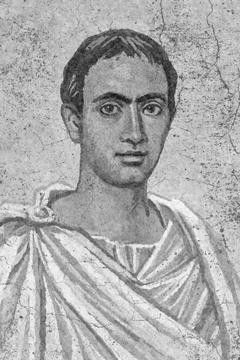Catullus: An Introduction
- Alexei Varah
- Jun 21, 2025
- 2 min read
Gaius Valerius Catullus, often referred to now as just his cognomen, Catullus, was born in 84 BC in Verona, a significant urban center in northern Italy. Even more so than Ovid, Catullus was born into a well-connected, wealthy family; his father is even said to have hosted Julius Caesar. While facts about Catullus' life are sparse and difficult to come by, much about his career and personal life can be inferred from his expansive, vivid body of work.

In around 57 BC, Catullus traveled to Bithynia, in Asian Minor, to serve as part of the provincial governor's staff. Yet, unlike most wealthy Roman citizens and poets of his era, Catullus remained uninvolved in politics and public life. Instead, Catullus partook in a literary movement breaking traditional poetic conventions. This group, known as the neoterics, or "new poets," rejected epic mythological themes and instead embraced the personal, intimate aspects of life as their prime poetic subjects. With an emphasis on linguistic precision and metrical diversity, Catullus pioneered a new way of approaching verse.
After he died around 54 BCE, Catullus's work nearly disappeared. In fact, much of Catullus's poetry survives today only thanks to the 1305 discovery of a single manuscript in Catullus's birthplace. Though the original was later lost, two copies of the manuscript were preserved; one of which currently resides in Oxford's Bodleian Library. Catullus's collection itself, comprised of 116 poems, is traditionally divided into three fluid groups: short lyrics, longer narrative poems, and satirical epigrams. Across all groups, Catullus's affinity for Alexandrian and Green lyrical traditions is made evident with his widespread use of hendecasyllabic meter.
Today, Catullus is best known for his poems addressed to his lover, Lesbia, who is likely a pseudonym for the artistocratic Clodia Metelli. These poems chart the highs and lows of their volatile relationship, providing a behind-the-scenes look into Catullus's emotional turmoil. One of his most famous verses, still widely quoted today, begins, “Let us live, my Lesbia, and let us love,” illustrating the profoundly personal nature of much of Catullus's poetry.
In addition to love poetry, Catullus's shorter works touch on friendship, grief, and even directly address his literary rivals, often with a sharply satirical edge. His longer works, while more narrative in scope, continue to reflect the same wit and emotional vulnerability present in their shorter counterparts. Indeed, in one of his most quoted verses, Catullus chronicles the tragic death of his brother at Troy.
Despite his poetry being nearly lost to history, Catullus's legacy persisted, having a profound impact not only on later Latin poets like Horace and Ovid but also on Renaissance writers including Robert Herrick and Christopher Marlowe. Catullus's words, themes, and unflinching portrayal of the human experience continue to resonate today, continuously being reimagined by artists ranging from Louis Zukofsky to William Wordsworth. His voice remains one of the most distinct in all of classical literature.
Hopefully, this brief biography has introduced you to or expanded your understanding of Roman poet Catullus. Please leave a comment below with any additional information about Catullus you'd like to see included in this post and your suggestions for which of Catullus's poems we should analyze first!



Comments